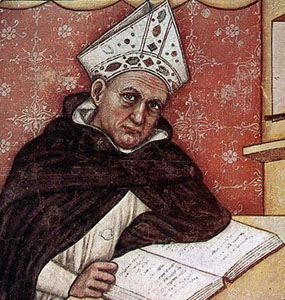aevum on:
[Wikipedia]
[Google]
[Amazon]
 In
In
/ref>
 In
In scholastic philosophy
Scholasticism was a medieval school of philosophy that employed a critical organic method of philosophical analysis predicated upon the Aristotelian 10 Categories. Christian scholasticism emerged within the monastic schools that translate ...
, the aevum (also called aeviternity) is the temporal mode of existence experienced by angel
In various theistic religious traditions an angel is a supernatural spiritual being who serves God.
Abrahamic religions often depict angels as benevolent celestial intermediaries between God (or Heaven) and humanity. Other roles include ...
s and by the saint
In religious belief, a saint is a person who is recognized as having an exceptional degree of Q-D-Š, holiness, likeness, or closeness to God. However, the use of the term ''saint'' depends on the context and Christian denomination, denominat ...
s in heaven
Heaven or the heavens, is a common religious cosmological or transcendent supernatural place where beings such as deities, angels, souls, saints, or venerated ancestors are said to originate, be enthroned, or reside. According to the belie ...
. In some ways, it is a state that logically lies between the eternity
Eternity, in common parlance, means Infinity, infinite time that never ends or the quality, condition, or fact of being everlasting or eternal. Classical philosophy, however, defines eternity as what is timeless or exists outside time, whereas ...
(timelessness) of God
In monotheism, monotheistic thought, God is usually viewed as the supreme being, creator deity, creator, and principal object of Faith#Religious views, faith.Richard Swinburne, Swinburne, R.G. "God" in Ted Honderich, Honderich, Ted. (ed)''The Ox ...
and the temporal experience of material beings. It is sometimes referred to as "improper eternity".
Etymology
The word ''aevum'' isLatin
Latin (, or , ) is a classical language belonging to the Italic branch of the Indo-European languages. Latin was originally a dialect spoken in the lower Tiber area (then known as Latium) around present-day Rome, but through the power of the ...
, originally signifying "age", "aeon
The word aeon , also spelled eon (in American and Australian English), originally meant "life", "vital force" or "being", "generation" or "a period of time", though it tended to be translated as "age" in the sense of "ages", "forever", "timeles ...
", or "everlasting time"; the word ''aeviternity'' comes from the Medieval Latin
Medieval Latin was the form of Literary Latin used in Roman Catholic Western Europe during the Middle Ages. In this region it served as the primary written language, though local languages were also written to varying degrees. Latin functioned ...
neologism
A neologism Greek νέο- ''néo''(="new") and λόγος /''lógos'' meaning "speech, utterance"] is a relatively recent or isolated term, word, or phrase that may be in the process of entering common use, but that has not been fully accepted int ...
''aeviternitas''.
History
The concept of the aevum dates back at least toAlbertus Magnus
Albertus Magnus (c. 1200 – 15 November 1280), also known as Saint Albert the Great or Albert of Cologne, was a German Dominican friar, philosopher, scientist, and bishop. Later canonised as a Catholic saint, he was known during his life ...
's treatise ''De quattuor coaequaevis''. Its most familiar description is found in the ''Summa theologica
The ''Summa Theologiae'' or ''Summa Theologica'' (), often referred to simply as the ''Summa'', is the best-known work of Thomas Aquinas (1225–1274), a scholasticism, scholastic theologian and Doctor of the Church. It is a compendium of all ...
'' of Thomas Aquinas
Thomas Aquinas, OP (; it, Tommaso d'Aquino, lit=Thomas of Aquino; 1225 – 7 March 1274) was an Italian Dominican friar and priest who was an influential philosopher, theologian and jurist in the tradition of scholasticism; he is known wi ...
. Aquinas identifies the aevum as the measure of the existence of beings that "recede less from permanence of being, forasmuch as their being neither consists in change, nor is the subject of change; nevertheless they have change annexed to them either actually, or potentially". As examples, he cites the heavenly bodies (which, in medieval science, were considered changeless in their nature, though variable in their position) and the angels, which "have an unchangeable being as regards their nature with changeableness as regards choice".Thomas Aquinas
Thomas Aquinas, OP (; it, Tommaso d'Aquino, lit=Thomas of Aquino; 1225 – 7 March 1274) was an Italian Dominican friar and priest who was an influential philosopher, theologian and jurist in the tradition of scholasticism; he is known wi ...
, ''Summa Theologica
The ''Summa Theologiae'' or ''Summa Theologica'' (), often referred to simply as the ''Summa'', is the best-known work of Thomas Aquinas (1225–1274), a scholasticism, scholastic theologian and Doctor of the Church. It is a compendium of all ...
'', First Part, Question 10, Article 5/ref>
Contemporary philosophy
Frank Sheed
Francis Joseph Sheed (20 March 1897 in Sydney – 20 November 1981 in Jersey City) was an Australian-born lawyer, Catholic writer, publisher, speaker, and lay theologian. He and his wife Maisie Ward were famous in their day as the names be ...
, in his book ''Theology and Sanity'', said that the aevum is also the measure of existence for the saints in heaven:
References
{{Catholic philosophy footer Angels in Christianity Concepts in metaphysics Christian saints Heaven in Christianity Infinity Philosophy of time Scholasticism